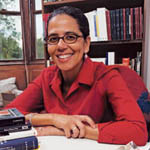The role of food, and of meals shared and meals denied in the struggle for American citizenship, will be the topic of Rafia Zafar’s Phi Beta Kappa Lecture at 4 p.m. Wednesday, April 20, in Lab Sciences, Room 300.

This Washington University in St. Louis Assembly Series event, the final one for this academic year, is free and open to the public.
Zafar, PhD, professor of English, of African and African-American studies, and of American culture studies in Arts & Sciences at WUSTL, will present “What’s Food Got to Do With It? Meals and Meaning in the Civil Rights Era.”
As a specialist in 19th-century American and African-American literature, Zafar studies food in American literature and culture. For this talk, she will focus on how the efforts to share food in integrated settings — of which the lunch counter sit-ins in the South are perhaps the most famous examples — advanced civil rights in the 1960s.
Zafar’s teaching and research examine literary themes and cultural depictions in American history from the late 18th century to the Harlem Renaissance.
Her publications include the co-editorship of God Made Man, Man Made the Slave: The Autobiography of George Teamoh, who was her great-great-grandfather and one of the first black officeholders in the post-Reconstruction era, and Harriet Jacobs and Incidents in the Life of a Slave Girl: New Critical Essays.
She also has published a study of early black writers, We Wear the Mask: African Americans Write American Literature 1760-1870. In September, a two-volume edition on Harlem Renaissance novels will be published by the Library of America.
The focus of Zafar’s talk is drawn from her ongoing study of the role food plays in African-American authorship.
Zafar joined the WUSTL faculty in 1998 and has served as director of the African and African-American studies program.
She earned a bachelor’s degree in English from City College of New York, a master’s degree in English and comparative literature from Columbia University, and a doctorate in the history of American civilization from Harvard University.
For more information on this program, visit assemblyseries.wustl.edu or call (314) 935-4620.
The Assembly Series will resume for the 2011-12 academic year in mid-September. Look for the new schedule of speakers in late summer.